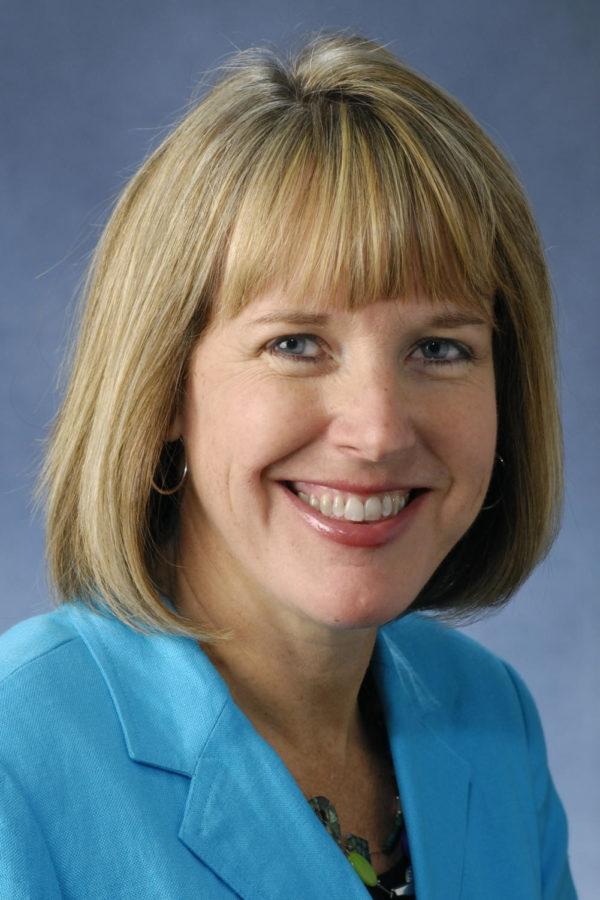- News
- News / Academics
- News / Politics And Administration
- News / Politics And Administration / Campus
- News / Student Life
ISU hosts Lori Reesor as candidate for vice president for Student Affairs
Credit/©: David McKinney/ Office of University Relations 09141 - 09/09/08
Studio portrait of Lori Reesor Associate Vice Provost in Student Success-Vice Provost
January 26, 2016
Lori Reesor, vice president for Student Affairs at the University of North Dakota, appeared at an open forum for the search of the new vice president for Student Affairs at Iowa State.
The forum took place Monday morning in the Pioneer Room of the Memorial Union.
Reesor is one of three candidates for the administrative position to replace retiring Tom Hill, senior vice president for Student Affairs.
Reesor graduated from the University of Wisconsin with a degree in business management before earning her master’s in higher education at Iowa State. Reesor also has a doctorate in leadership and educational policy from the University of Kansas.
Reesor said she is excited to be selected as one of three finalists for this position because it “feels like coming home.”
“It’s a way to come home, but it’s really about the reputation of the institution,” she said. “This organization has a great reputation nationally … so to have that privilege to continue that and to take it to the next level would be fabulous.”
Reesor’s plans to take Iowa State to the next level include student retention and success, diversity and inclusion and learning how to prioritize certain needs.
“The goal is to have students fall in love with Iowa State, to be proud alumni of Iowa State and to want to continue to give back,” Reesor said.
She plans on accomplishing these goals by creating an inclusive environment through having what she calls “difficult discussions.”
Iowa State has reached a record in enrollment for the 2015-16 year, which means resources aren’t as available and abundant. Reesor said the best way to combat this issue is by building relationships with the staff and finding what is most important.
“We can’t keep doing more with less. That means we have to prioritize,” she said. “That goes back to the difficult conversations because if you say to stop doing what I’m doing today does that mean what I was doing wasn’t important? Does that mean I was wasting my time? … It just means we have to shift and find our new priorities.”
“If you’re doing this, and you’re doing this, and you’re doing this, what if we combine that? That means partnerships with the academic affairs, partnerships with business and finance, and that means partnerships about what’s the right thing to do for the institution,” she said.
Reesor said difficult conversations are also needed to identify and solve issues with diversity and inclusion on campus.
“We have to be able to talk about hard issues,” Reesor said. “These issues are so complex, they’re historical, they’re societal and to say we can solve this would be really, really hard but we have to work on this. So this means we need to have really hard conversations, which means we need to have openness and the creation of trust.”
Pulling from a web seminar she had with Penny Rue, Wake Forest’s vice president of campus life, Reesor said the university must listen, feel and act to solve some of these problems.
“That doesn’t need to just be in crisis mode, that needs to be all the time,” Reesor said.
Reesor also talked about her history and experience with dealing with campus issues involving diversity.
When the University of North Dakota’s mascot was known as the Fighting Sioux two years ago, off-campus students designed “absolutely horrific T-shirts of Native Americans drinking.” Reesor said the T-shirts affected the university and the students on campus, leading to national news coverage and a campus-wide protest.
“It was easy to say, ‘Oh, well it happened off campus, there was no official university organization supporting it’ … but because they were students it was the university’s challenge,” she said. “We said, ‘You know we don’t agree with this either and we will look into it from a disciplinary aspect to see if any violations have occurred, but were going to protest with you.’
A lot of times when you protest, you need it to be somebody’s fault, and it was easy for it to be the administration’s fault, but we didn’t support this either,” Reesor continued. “It changed the tone for the president and all of us to be walking with the students and to say, ‘We are united with you.’”
Reesor also hopes to get students’ parents more involved with the university because their emotional support is helpful for student success and are key tools for fundraising.
Reesor’s ultimate goal is to provide an environment that will garner student success and positive experiences.
“The reason our students are here is to be academically successful, and we have to figure out what that means and how to support that,” she said. “It’s really about supporting that students are successful in the classroom and outside the classroom and that they graduate from this institution. Everything we do in Student Affairs has to support that students are very successful, and that means partnership, that means developing relationships, that means being an advocate for students and to make sure every student has a positive experience here.”
Reesor said she needs help to accomplish these goals, not only from other staff members, but with a little bit of magic, too.
“It’s broader than Hilton Magic, it’s about Iowa State magic,” Reesor said.

















